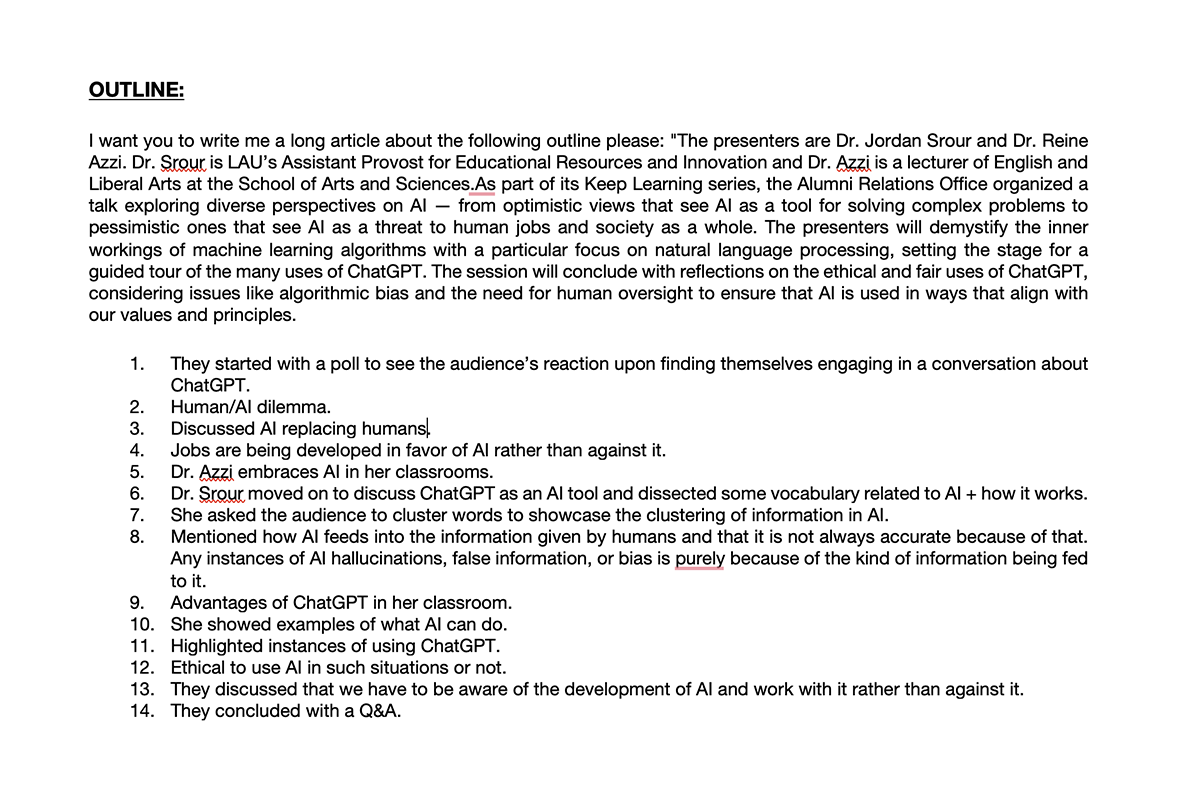Let’s ChatGPT – Unedited
Following several prompts, ChatGPT generated this article, which we publish unedited, covering a talk at LAU on the potential and limitations of AI and its impact on various aspects of our lives.
The development of artificial intelligence (AI) has been one of the most significant technological advancements of the 21st century. With the increasing complexity of human tasks and the rise of digital technology, AI has become a vital tool for solving complex problems. However, there is a debate about the implications of AI for human jobs and society as a whole. In this article, we will explore the perspectives on AI from two experts, Dr. Jordan Srour and Dr. Reine Azzi, who gave a talk as part of the Alumni Relations Office’s Keep Learning series.
Dr. Jordan Srour, LAU’s Assistant Provost for Educational Resources and Innovation, and Dr. Reine Azzi, a lecturer of English and Liberal Arts at the School of Arts and Sciences, started the talk by conducting a poll to see the audience’s reaction to ChatGPT, an AI tool that they will be discussing during the session. The poll showed a mixed reaction, reflecting the ongoing debate around AI.
The speakers then moved on to the human/AI dilemma, discussing the fear that AI will replace humans in various industries. However, Dr. Srour highlighted that while some jobs may be replaced, new jobs are being developed in favor of AI rather than against it. Moreover, Dr. Azzi embraced the use of AI in her classrooms, which allowed her students to access a vast amount of knowledge and information that was previously unavailable.
Dr. Srour then moved on to discuss ChatGPT as an AI tool and dissected some of the vocabulary related to AI, explaining how it works. She asked the audience to cluster words to showcase the clustering of information of AI, highlighting how AI feeds into the information given by humans and that it is not always accurate because of that. Any instances of AI hallucinations, false information, or bias are purely because of the kind of information being fed to it.
Dr. Azzi then showed examples of what AI can do and highlighted instances of using ChatGPT in her classroom. She discussed the advantages of ChatGPT, such as its ability to provide quick answers and generate ideas, but also raised ethical concerns about the use of AI. She emphasized that we have to be aware of the development of AI and work with it rather than against it. It is important to ensure that AI is used in ways that align with our values and principles, taking into consideration issues like algorithmic bias and the need for human oversight.
The talk concluded with a Q&A session where the audience was given the opportunity to ask questions and share their perspectives. The session highlighted the importance of understanding AI and its implications for society. While AI has the potential to revolutionize various industries and improve our lives, it is essential to use it ethically and with caution.
In conclusion, the Keep Learning series talk by Dr. Jordan Srour and Dr. Reine Azzi provided a valuable insight into the diverse perspectives on AI, showcasing the potential benefits and ethical concerns associated with AI. The use of AI is inevitable, and it is up to us to ensure that it is used ethically and in ways that align with our values and principles.
The article and the photos were altogether generated by AI based on suggested prompts.

